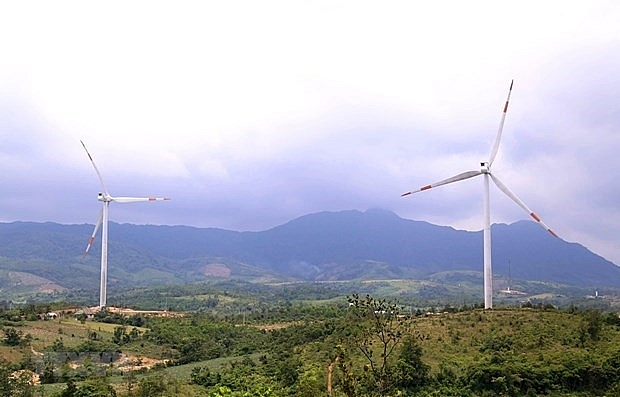Experts suggest raising proportion of offshore wind power in new power plan
 |
| Illustrative image (Photo: VNA) |
Hanoi - Vietnam needs to increase the proportion of wind power, especially offshore wind power, in the total power capacity targeted in the National Power Development Plan for 2021-2030 with a vision to 2045 (Power Development Plan VIII), so as to attract more foreign investors in the field, according to businesses and experts.
The country is considered an offshore wind power centre of the world and holds substantial potential for development.
Developing offshore wind power has been assessed as one solution that would help Vietnam ensure the sufficient supply of electricity at lower prices, gain independence from imported fuel, increase the localisation rate, generate more jobs, and cut greenhouse gas emissions, as the Government has committed.
The Power Development Plan VIII only sets a target of 2-3GW of wind power capacity by 2030, however, accounting for 1.45-2 percent of total power capacity.
In this plan, the proportion of renewable energies, excluding hydropower, will make up nearly 30 percent in 2030, with the capacity of wind power to increase three-fold compared to the figure in the adjusted Power Development Plan VII, but be mainly inshore and near-shore.
The World Bank (WB) assesses that Vietnam’s offshore wind power has the potential to generate 475GW, while the Danish Energy Agency (DEA) says the country possesses a long coastline and has the potential for 160GW of wind power within a radius of 5-100 km from the shore.
Therefore, the two organisations have proposed that Vietnam increase the capacity of offshore wind power to 10GW by 2030.
According to the draft Power Development Plan VIII, Vietnam will need about 128 billion USD in investment in electricity by 2030.
The Vietnam Energy Association said that with investment of 2.5-3 billion USD per gigawatt of offshore wind power, Vietnam is likely to attract hundreds of billions of USD over the course of the next decade.
What the stars mean:
★ Poor ★ ★ Promising ★★★ Good ★★★★ Very good ★★★★★ Exceptional
Related Contents
Latest News
More News
- Citi economists project robust Vietnam economic growth in 2026 (February 14, 2026 | 18:00)
- Sustaining high growth must be balanced in stable manner (February 14, 2026 | 09:00)
- From 5G to 6G: how AI is shaping Vietnam’s path to digital leadership (February 13, 2026 | 10:59)
- Cooperation must align with Vietnam’s long-term ambitions (February 13, 2026 | 09:00)
- Need-to-know aspects ahead of AI law (February 13, 2026 | 08:00)
- Legalities to early operations for Vietnam’s IFC (February 11, 2026 | 12:17)
- Foreign-language trademarks gain traction in Vietnam (February 06, 2026 | 09:26)
- Offshore structuring and the Singapore holding route (February 02, 2026 | 10:39)
- Vietnam enters new development era: Russian scholar (January 25, 2026 | 10:08)
- 14th National Party Congress marks new era, expands Vietnam’s global role: Australian scholar (January 25, 2026 | 09:54)

 Tag:
Tag:



















 Mobile Version
Mobile Version